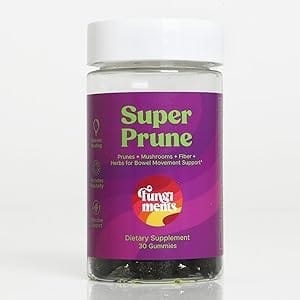Dried prunes have long been touted as a natural remedy for digestive issues, but these wrinkly fruits may offer far more health benefits than meets the eye. Recent research suggests dried prunes could play a role in supporting bone health, reducing inflammation, and even protecting against certain cancers. Let's explore the science behind this unassuming superfood and separate fact from fiction.

Key takeaways:
• Dried prunes are a rich source of fiber, vitamins, minerals, and antioxidants
• Regular prune consumption may help improve bone density and reduce fracture risk
• Prunes have a low glycemic index and may aid in blood sugar control
• The high sorbitol content in prunes contributes to their laxative effect
• Moderation is key - excessive prune intake can lead to digestive discomfort
Are prunes dried plums?
Yes, prunes are indeed dried plums. Specifically, they are made from certain cultivars of plum that lend themselves well to drying without fermenting due to their high sugar content. The most common variety used for prune production is the European plum (Prunus domestica)[1].
The drying process concentrates the nutrients and sugars in the plum, resulting in a fruit that's not only sweeter but also has a longer shelf life. This concentration effect is why prunes have a higher calorie and nutrient density compared to fresh plums[2].
Dr. Sarah Johnson, Assistant Professor of Food Science and Human Nutrition at Colorado State University, explains: "The drying process changes the chemical composition of the plum, increasing the concentration of certain compounds like sorbitol and phenolic antioxidants. This is why prunes have more intense effects on digestion and potentially greater health benefits than fresh plums."
Dried prunes for constipation
One of the most well-known uses for dried prunes is as a natural laxative. This effect is due to several factors:
- High fiber content: Prunes are rich in both soluble and insoluble fiber, which can help promote regular bowel movements[3].
- Sorbitol: This sugar alcohol has a natural laxative effect by drawing water into the intestines[4].
- Phenolic compounds: These may stimulate beneficial gut bacteria and aid in digestion[5].
A 2011 study published in Alimentary Pharmacology and Therapeutics found that prunes were more effective than psyllium (a common fiber supplement) for treating mild to moderate constipation[6].
However, it's important to note that while prunes can be effective for occasional constipation, they should not be relied upon as a long-term solution for chronic digestive issues. Always consult with a healthcare provider for persistent digestive problems.
Dried prunes vs plums
While both fresh plums and dried prunes offer health benefits, their nutritional profiles differ significantly:
| Nutrient (per 100g) | Fresh Plums | Dried Prunes |
|---|---|---|
| Calories | 46 | 240 |
| Fiber | 1.4g | 7.1g |
| Potassium | 157mg | 732mg |
| Vitamin K | 6.4μg | 59.5μg |
| Antioxidants | Lower | Higher |
As the table shows, dried prunes are more calorie-dense and nutrient-rich compared to fresh plums. This concentration of nutrients is why prunes are often considered a "superfood"[7].
Dr. Shirin Hooshmand, Professor of Nutrition at San Diego State University, notes: "The drying process concentrates not just the sugars, but also the beneficial compounds in plums. This is why we often see more pronounced health effects in studies using prunes rather than fresh plums."
Prune is dried plum?
This question often arises due to confusion about terminology. To clarify:
• All prunes are dried plums, but not all plums can be made into prunes.
• The term "prune" specifically refers to the dried fruit of certain plum varieties.
• In some countries, marketing efforts have led to dried plums being labeled as "dried plums" instead of "prunes" to improve their image.
The distinction is important because the drying process significantly alters the fruit's chemical composition and potential health effects. For example, the concentration of phenolic compounds in prunes is much higher than in fresh plums, which may contribute to their stronger antioxidant and anti-inflammatory properties.
Beyond digestion: Other potential health benefits
While prunes are best known for their effects on digestive health, emerging research suggests they may offer a range of other health benefits:
- Bone health: Several studies have found that regular prune consumption may help improve bone mineral density and reduce the risk of osteoporosis, particularly in postmenopausal women.
- Heart health: The high potassium content and antioxidants in prunes may contribute to lower blood pressure and reduced risk of heart disease.
- Blood sugar control: Despite their sweetness, prunes have a low glycemic index and may help improve blood sugar control in people with diabetes.
- Cancer prevention: Some studies suggest that the high antioxidant content in prunes may help protect against certain types of cancer, though more research is needed in this area.
Conclusion
Dried prunes offer a concentrated source of nutrients and potential health benefits that go beyond their well-known effects on digestion. While more research is needed to fully understand their impact on various aspects of health, incorporating moderate amounts of prunes into a balanced diet appears to be a safe and potentially beneficial choice for most people.
As with any dietary change, it's important to introduce prunes gradually and pay attention to your body's response. While prunes can be a healthy addition to many diets, their high fiber and sorbitol content may cause digestive discomfort if consumed in large quantities 🍇
Interested in learning more about how diet can impact longevity and overall health? Subscribe to our newsletter for the latest updates on nutrition science and healthy aging research.
References:
- https://www.ncbi.nlm.nih.gov/pmc/articles/PMC5409740/
- https://fdc.nal.usda.gov/fdc-app.html#/food-details/171719/nutrients
- https://www.ncbi.nlm.nih.gov/pmc/articles/PMC3775192/
- https://pubmed.ncbi.nlm.nih.gov/18028575/
- https://www.ncbi.nlm.nih.gov/pmc/articles/PMC5713270/
- https://pubmed.ncbi.nlm.nih.gov/21323688/
- https://fdc.nal.usda.gov/fdc-app.html#/food-details/171719/nutrients
- https://www.ams.usda.gov/rules-regulations/moa/986-dried-prunes
- https://www.ncbi.nlm.nih.gov/pmc/articles/PMC5409740/
- https://pubmed.ncbi.nlm.nih.gov/21736801/
- https://www.ncbi.nlm.nih.gov/pmc/articles/PMC5409740/
- https://pubmed.ncbi.nlm.nih.gov/20460283/
- https://www.ncbi.nlm.nih.gov/pmc/articles/PMC6567026/
Citations:
[1] https://www.webmd.com/diet/prunes-health-benefits%231
[2] https://www.medicalnewstoday.com/articles/315340
[4] https://www.bbcgoodfood.com/health/nutrition/health-benefits-prunes
[5] https://inc.nutfruit.org/health-benefits-of-prunes/?members-area=1
[6] https://www.ncbi.nlm.nih.gov/pmc/articles/PMC5409740/
[7] https://www.healthline.com/nutrition/benefits-of-plums-prunes














Member discussion